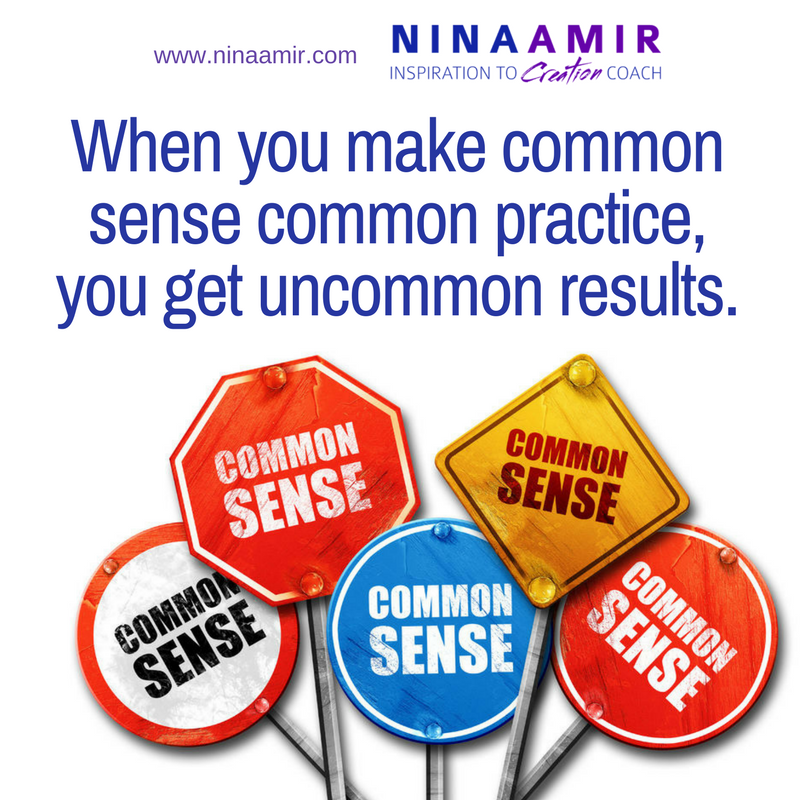 “Common sense is not always common practice,” New York Times bestselling author Brendon Burchard likes to say. Think about that. What common sense do you have that you do not act on…maybe ever?
“Common sense is not always common practice,” New York Times bestselling author Brendon Burchard likes to say. Think about that. What common sense do you have that you do not act on…maybe ever?
Has anyone ever said to you, “You lack common sense” or “That is common sense”? I’ve certainly heard similar language directed at me. “Nina, don’t you know that’s common sense?”
If you and I know something is common sense, why don’t we behave, act, or do something different? Why don’t we take action that shows that we have common sense? What’s the reason we don’t make common sense common practice?
Common Practice Feels Hard and Uncomfortable
The answer to that question is the same one I’d use to explain why we don’t do just about anything we know we “should” do or even want to do. It feels hard and uncomfortable. Or we are happy doing what we’ve always done…despite knowing that doing it differently would improve our lives or make more sense.
For example, you know you should drive the speed limit but always drive 10 or 15 miles per hour over the limit. Each time you get on the road, you think, “I really should drive the speed limit. I could get a ticket.”
You know that eating ice cream isn’t good for you and want to lose weight. Yet, you eat ice cream five times a week. Every time you head for the freezer, you say to yourself, “I really shouldn’t eat that ice cream. I know better…and I want to lose weight.”
You know exercising…even a little bit…each week would make you healthier, but you choose to sit on the couch and watch television instead. Or you know using a calendar—maybe even one on your phone—and scheduling all your activities would help you be more organized and prompt but you continue to rely on memory instead. Perhaps you’ve done something that caused someone you care about to feel hurt; you know you should apologize, but you don’t.
In each case, your mind feeds you the information or knowledge that says, “Do it differently this time!” But you don’t…and then you wonder why you don’t demonstrate common sense. Or someone points out to you that you lack just that—common sense.
[Tweet “If you don’t start making common sense a common practice, everything stays the same.”]
Common Sense vs. Common Knowledge
How does common sense differ from common knowledge? Common knowledge is something we all know. We all understand why driving the speed limit, apologizing when we do something hurtful, and eating and exercising to reach optimum health are good for us. That makes such common knowledge sensible—a good idea. The common knowledge makes sense. Therefore, it makes common sense.
For instance, you might know the benefits of slowing down and reducing stress in your life. You’ve read all the articles and books…even had the information confirmed by doctors. And you know you spend your days rushing around and “putting out fires” at work and home. You have developed high blood pressure from stress and always feel tired and frazzled.
It makes perfect sense for you to slow down, sleep more, meditate, and exercise—all of which would make you a relaxed and healthier person. Changing your way of operating each day would make total sense. In fact, it’s common sense—and numerous people don’t miss the chance to tell you so.
Even though it makes sense to you, you still don’t do it.
That’s crazy, isn’t it? You…and me…have all this fabulous knowledge that makes sense for us to put to use, yet we don’t use it.
Transform Common Sense into Common Practice
Not making common sense common practice is cray-cray especially when you know you want something to change or you want to change. If you don’t start making common sense a common practice, everything stays the same.
If you know you need to go to sleep earlier so you can get up earlier and be more productive, you need to take that knowledge and put it into action. You need to act based on common sense. You need to make common sense common practice.
As you act on common knowledge that makes sense to the results you want to create, you turn it into common practice. The behavior becomes habitual or automatic. It’s what you do consistently.
As a result, you develop a new habit that helps you get the results you desire. Your behavior becomes common. It’s not uncommon behavior. Instead, it’s a common practice.
[Tweet “When you make common sense common practice, you get uncommon results.”]
Three Ways to Develop Common Practices
How can you develop common practices to go with your common sense? Take the following three steps consistently, and watch yourself turn what you know into what you do.
- List the things you know are common sense. (Or list the common knowledge you possess.)
- Check off the items you consistently take action on already.
- Circle the items you don’t take action on consistently or at all.
- Choose one to three bits of common knowledge or sense to take action on this coming week.
- Take action consistently until common sense (or knowledge) becomes common practice—a habit.
Like any attempt to form a new habit, you must commit to that action for 30 to 60 days. At the end of that period, the action should be common practice or a part of what you do each day automatically. And you will reap the results of your common practice.
Your Common Practice Inspires Others
Of course, the common practice may only be common for you! Just because it is based on common sense or knowledge doesn’t mean every around you will take it on as a practice, too.
But you will have broken through the desire to remain comfortable and entrenched in habits that don’t serve you. You will have acted on common knowledge because you know it makes sense. And you will be reaping the rewards in the form of new, positive results.
Why? Because when you make common sense common practice, you get uncommon results.
Others will notice how your common practice has changed your outcomes. You will become an excellent role model of how to put common sense into common practice. And that will inspire others to do the same.
What common knowledge are you going to transform into common practice? Tell me in a comment down below.
Never miss one of my videos! Click here to subscribe to my YouTube channel.
 Need some help turning your common knowledge…the information you possess that you know makes common sense…into common practice? Give me an hour of your time, and I’ll help you do just that. I’ll give you at least five new tools and strategies that help you get uncommon results. Apply for a free Certified High Performance Coaching Strategy Session here.
Need some help turning your common knowledge…the information you possess that you know makes common sense…into common practice? Give me an hour of your time, and I’ll help you do just that. I’ll give you at least five new tools and strategies that help you get uncommon results. Apply for a free Certified High Performance Coaching Strategy Session here. Photo courtesy of argus456 / 123RF Stock Photo


